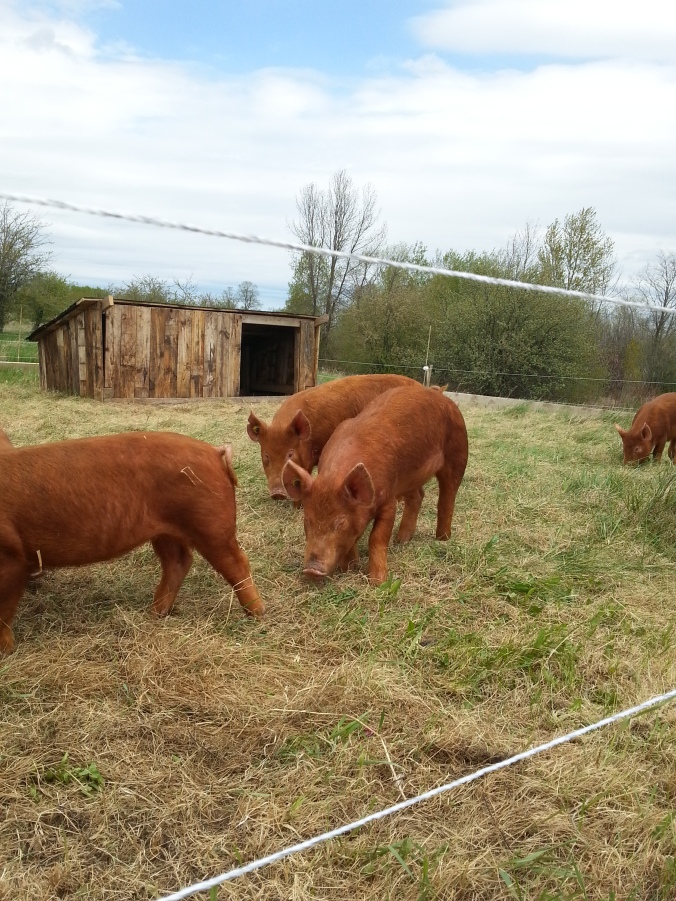I am happy to announce that we now have pork for sale. Our Tamworth pigs (a heritage breed) are pastured (raised outdoors, able to freely dig and forage, as is their nature) and fed organic feed supplemented by garden/kitchen scraps. These pigs have led a contented existence, lounging under the apple trees, happily wallowing in the mud, playing and bickering like siblings, and being pet. I have very much enjoyed my time with them.
If you want to learn why our pastured pork is the choice to make, please read on!
For those of you who already know why pastured pork is superior to factory-farmed, you can click here to see our price list.
Why Organic? Why Small Scale? Why Pastured? Why Pork?
Many people wonder why small-scale, ethically-raised animals cost so much more than industrially-produced meats from the supermarket. There are several factors that contribute to this, but we believe that the benefits far outweigh higher prices:
Feeding livestock organic feed is important not just environmentally because the grains are grown without chemical inputs and genetic modification, but also because what we feed our animals ultimately becomes the meat we eat. As a purchaser of several tons of grain each year in pig feed, I recognize the environmental impact the herbicides used on conventional crops will have. I support the kind of agriculture that I want to dominate the market in order to encourage change. Conventional supermarket pork is fed on genetically-modified soy and corn, and all kinds of industrial waste, such as floor-scrapings at food-plants including candy and animal waste in order to lower cost.
Unfortunately, small-scale agriculture always costs more than its industrial counterpart, as the economies-of-scale and access to government subsidies favour the biggest farms. Despite these challenges, smaller farms can have a major benefit in regards to quality-of-life for the herd. Pigs raised in the conventional system have no kind of life at all, but our pigs thrive. Small-scale production may cost farmers and consumers more, but also provides more.
Beyond the ethics of raising animals on organic feed and on pasture, there are substantial differences in taste and texture of pork raised in Confined Animal Feeding Operations (CAFOs) and on pasture. Our pigs use their bodies daily – sure, they love to lounge around in the mud and in the shade of the trees, but they are also walking, playing, rooting, and generally using their muscles in the outdoor space. Because of this, the muscle meat is much more dense – not mushy like pork from the supermarket. You will find that it is a lot more red: this is because of the mitochondria necessary in an active muscle tissue vs. the sallow flesh of confined animals (the same reason chicken legs are ‘dark meat’ vs. the ‘white meat’ of the breast in those mostly-flightless birds). These factors are indicators that the meat you are eating is from a healthy animal, not a sickly, confined one.
And what about the fat? An interesting tidbit about pastured pork is that their fat is one of the rare food-sources of vitamin D. They produce vitamin D from contact with the sun, and store it in their fat, making it a great source for us in the dark Canadian winters! Pork fat (lard) is about 40% saturated fat. Saturated fat has a chemically-stable structure, which makes it resistant to oxidation – both while storing and cooking, and within the body. This is important because oxidation creates free-radicals (molecules that cause chronic-inflammation, especially in the vascular lining leading to heart disease, and all kinds of degenerative disease). Think saturated=stable. Saturated fats interact less with other molecules in the body, making them essentially inert. Saturated fatty acids are also used in the body to stabilize cell membranes. Lard has an even greater percentage of monounsaturated fat (45%). Monounsaturated fat is the heart-healthy fat that has everyone singing the praises of olive oil! It has a low percentage of polyunsatrated fats (essential, but reactive in cooking and within the body, something we generally want to eat less of), and of that small amount, it has a good ratio of omega 6:3 at between 6-7: 1 . Taking in too high a ratio of omega 6:3 is another major factor in inflammation leading to chronic disease, so we’re winning here as well. Overall, pastured pork is a good source of healthy fats.
What about medications? Not only have we never given antibiotics to these pigs, there has been absolutely no reason to. Being raised outdoors, in a small herd makes them strong and healthy. Digging their noses into the dirt all day diversifies and strengthens their microbiomes, giving them strong immune-systems. Living in outdoor space, not in confinement or concentration with too many animals, lowers the risk of communicable bacterial infections.
I fully believe that these animals had a high quality of life. They enjoyed themselves each day, and I loved to watch them doing so. If you have any questions about how our pigs are raised, please don’t hesitate to ask! We love talking about our farming practices.
Please contact us to place an order for organically-fed, pastured pork. (Email morgancoopermorgan@gmail.com). If you are interested in buying in bulk (a half or whole hog) for December, please contact as well.
Note: Bulk orders are limited and will be taken on a first-come-first-served basis.
